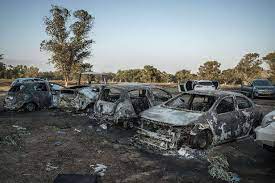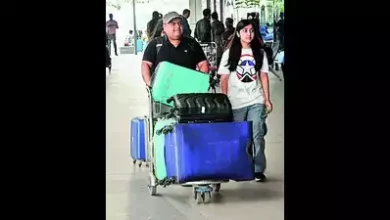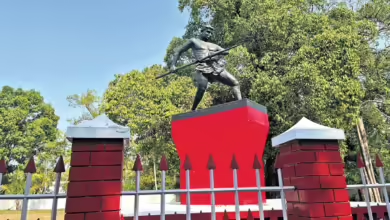Indian Students Recount Last Few Days in War-Torn Israel: Sirens, Missile Booms, and Bunker Runs
Indian students recall their final few days in war-torn Israel before they were safely evacuated back to India as being filled with blaring sirens every few hours, missiles dropping a few kilometers away, running from the room to the bunker in just a few seconds to make it in time, and living in constant fear of what was going to be the next.
For these pupils, who have been there for some time and had practiced the drill of racing to a secure shelter at the sound of it, the sound of sirens alerting there is a missile about to be launched was not wholly unfamiliar, but this time it was different, and the emotion of panic was much deeper.
On October 7, the first day that the terrorist organization Hamas assaulted Israel by launching hundreds of rockets into its southern and central areas, Sravya Rao, a PhD student doing research in electro-optical engineering, was awakened by the sound of one such alarm.
“A siren outside woke me up at 6:30 am, and I immediately went to the bunker on my level. Prior to that, I assumed this was one of those sirens, but after that, there was another one, and as the news spread worldwide, footage of deaths and militants entering towns with weapons began to circulate. As you see in movies, nobody expects that to occur in reality. At this point, the terror and scope of the strike overcame us. The news was initially seen on television by my grandpa, who then passed it along to my parents, who immediately contacted me out of fear. There was no choice but to reassure them that the campus was secure, according to Rao, a student at a university in Beersheba, southern Israel, 40 kilometers from the Gaza border.
According to Rao, the institution informed students that there had been a terror incident around an hour and a half after the first alert. Since the semester began on October 17, there weren’t many students in the dorm. “No one anticipated that a war would break out. We believed the bombing to be a one-off and that it would eventually end. Despite the circumstances, we had supplies, and the campus grocery was open. Simply put, the bigger dread persisted constantly. We were unaware that we would need to be evacuated at the moment. We were instructed to add our details to the WhatsApp group for Indian students, which also includes a representative from the Indian embassy, just in case. Then, a day later, we received an email alerting us of the evacuation procedure,” said Rao, who boarded the first aircraft on October 14 that carried Indians, mostly students, back.
The research student, who is now back in Bangalore with her family, said that she is just waiting for the violence to end before returning, even though the institution had delayed the start of the semester to November 5.
Even though everyone in this country has applications that provide knowledge about bombings in advance, this was the first time infiltration with armed terrorists wandering the city, which inflicted the most damage. On a day that marked the conclusion of a festival, everyone was enjoying a leisurely day when the assault took place.
Being that Israel is recognized for its research institutes in science and math, the majority of the returning students are those who are pursuing research.
Another study associate, Binita Ghosh, who is a student at a university in Tel Aviv, central Israel, said that a siren woke her up, and she then roused a few others to get to the bunkers. You have 90 seconds to get to the bunker in Tel Aviv. Since I started attending this institution last year, I had only sometimes heard a siren, but this one was distinct. My parents were shown some recordings of the assault by certain family members, and they were so terrified that they advised me to take the first flight home without worrying about money, said Ranchi, Jharkhand native and biology research student Ghosh.
However, she said, the Indian consulate in this city has been quite helpful. Up to the evacuation, they returned calls and even provided mental and emotional assistance. “Even the university had Zoom sessions with us addressing our concerns,” she said.
Looking back, Ghosh said that she finds it tragic that people are killing one other everywhere, and that even if she returns, things won’t be the same. It’s upsetting to see a location where you’ve lived for more than a year and formed friends being completely destroyed. It won’t be the same even when institutions ultimately open, she added.
Alok Mishra, a research scientist in central Israel who also returned to India on the same trip, said that he realized there had been some kind of assault because the alarm continued to sound throughout the morning. Because of the smoky smell that pervaded the area, it was odd. A rocket that had just touched down approximately a kilometer distant was visible in the form of smoke clouds. “We continue to get updates and notifications about the rocket’s fall date and location. They don’t even conceal facts, even in the event of a false alarm, according to Mishra, who is from Pratapgarh in UP.
He said that despite visiting several European cities, Israel had the greatest business and social environments. If you have a problem with food or anything else, folks there will assist you even if they don’t know you. The fact that we had to return this way when people were dying there is the saddest thing. But we anticipate returning shortly,” Mishra added.







